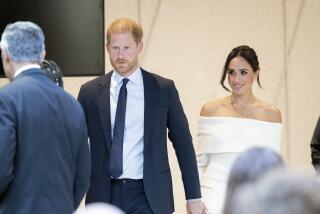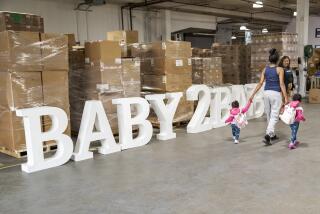Make-A-Wish Has Wish of Its Own: More Donated Frequent Flier Miles
- Share via
The Make-A-Wish Foundation faces the possibility that, for the first time in its 22-year history, it may have to deny a request from a terminally ill child, officials say.
Dependent on 1 billion donated frequent flier miles annually to grant many of its dream dates, the foundation is suffering from a nationwide dearth in charity to and from airlines.
The Los Angeles chapter alone needs about 15 million donated miles to send children and their families to dream destinations--most often Hawaii--but is scheduled to receive only 600,000 miles this year as its share of the national coffers.
Among the children the organization is trying to serve is Erika Monfiero, 9, who is scheduled to fly to Florida in June. Her wish, to visit DisneyWorld, comes just as she is recovering from a relapse of leukemia.
Her mother, Sherilynn Monfiero of Long Beach, said the trip is a dream for the whole family.
“We’ve never been able to take her farther than Las Vegas, and that’s only because I have a brother who lives there,” she said.
The wishes of children like Erika are forcing Make-A-Wish to improvise.
“We’re trying to scramble, but we really haven’t been able to,” said Judith Lewis, the chapter’s president and chief executive. “We’ll survive. We just haven’t figured out how yet.”
Tapped out this month, the Make-A-Wish Foundation of Greater Los Angeles has dipped into reserves to buy tickets to send a family of five to Hawaii, she said.
To grant an estimated 140 trips this year, Make-A-Wish Los Angeles would have to spend hundreds of thousands more from an already tight budget, she said. This year, it expects to grant 335 other wishes that would not involve air travel.
The problem is hitting Orange County’s Make-A-Wish Foundation as well, with frequent-flier-mile donations down about 50%.
As a result, said Fred Johnson, the nonprofit’s chief executive, the group is having to pay for tickets once donated to the tune of about $60,000 to $75,000 a year.
“People are still a little scared to fly, so we’re not getting the miles,” Johnson said of the Tustin-based chapter, which grants about 125 wishes a year, 30% to 40% of them involving trips.
The foundation recently stepped up its fund-raising efforts, especially with organizations and individuals willing to sponsor specific wishes.
“We haven’t ever turned anyone away,” Johnson said, “and we’re not going to.”
Several factors account for the shortfall in frequent flier donations. The number of air travel passengers dropped sharply after Sept. 11. Fewer travelers means fewer frequent flier miles earned.
“After 9/11, I thought maybe the mail had stopped,” Lewis said. “We got almost nothing in the way of support.”
Airlines, facing tough budget decisions, have slowed their donations of free air miles as well.
America West, for example, gave 20 million matching miles to its charities at the end of 2001 as a one-time effort to get people to keep giving.
The campaign worked, bringing in more than 2.5 million miles from travelers in October and November.
But even with the extra push, donations have fallen dramatically this year, said C.A. Howlett, senior vice president of public affairs.
Some Travelers Begin Hoarding Free Flights
Also, now that several airlines have dropped expiration dates from their frequent flier programs, some travelers are hoarding the free flights instead of donating them to charity.
Adriene Davis, a spokeswoman for Indiana University’s Center on Philanthropy, said a fear of flying is probably not the biggest cause of the slumping donations.
“Our research over time shows that the economy, more than anything else, correlates with giving levels,” Davis said.
The Make-A-Wish Foundation and other agencies say they have not yet recovered from a falloff in donations of all sorts since the Sept. 11 terrorist attacks.
Conversely, some charities reported unprecedented giving after the disaster.
USC public policy professor James Ferris said the problems of Make-A-Wish and other charities show the danger of relying too heavily on a single type of donation, such as frequent flier miles.
“It’s easy to go along and grow and survive on free miles when everybody’s giving them away,” said Ferris, director of USC’s Center on Philanthropy and Public Policy. “But you have to diversify for times like this.”
The foundation also should not expect to replace all its air miles with cash donations, Ferris said, because it’s harder to write a check than to hand over a flight voucher.
Competition With Other Charities Also a Factor
Another factor complicates the plight of Make-A-Wish--competition.
Just over a decade ago, Make-A-Wish Foundation and Ronald McDonald House were among the few charities requesting miles from donors, said Randy Peterson, publisher of webflyer.com and InsideFlyer Magazine.
Now, Petersen said, more than 1,000 charities--local and national--are vying for the currency. “Everybody’s figured out the game now,” Peterson said. “It will never be the same for Make-A-Wish.”
Peterson has launched a Web site, www.miledonor.com, to serve as a clearinghouse for those who want their air miles to go to charity.
Phoenix-based Make-A-Wish, with a $105-million annual budget, serves about 10,300 children nationwide each year. About two-thirds of the wishes include travel.
Terrorism, a battered economy and competition for business travelers have made it harder to grant the last request of the next child who wants see eagles before dying, but one Westlake Village mother said she hopes Make-A-Wish prevails.
Tammy Hospodar, whose son Michael released the ceremonial eagle of the Chilkat tribe in Haines, Alaska, in November 2000, said the Make-A-Wish-funded trip made Michael’s struggles against cystic fibrosis easier for the whole family to bear.
“Whatever the cost was, the benefit was priceless,” Hospodar said.
In recent years the family had enjoyed trips to the Santa Barbara Zoo, and Michael, now 13, had grown to love visiting an eagle there. Then someone stole it. His request to Make-A-Wish: simply to see another eagle.
“We thought someone was going to bring an eagle to our door and let him pet it,” his mother said.
Instead, Make-A-Wish flew the family of four to Alaska, where Michael saw hundreds of nesting eagles and was given a key to the city of Juneau.
*
Times staff writer David Haldane contributed to this report.


